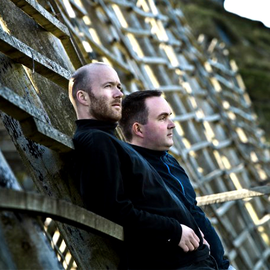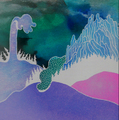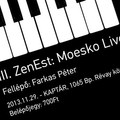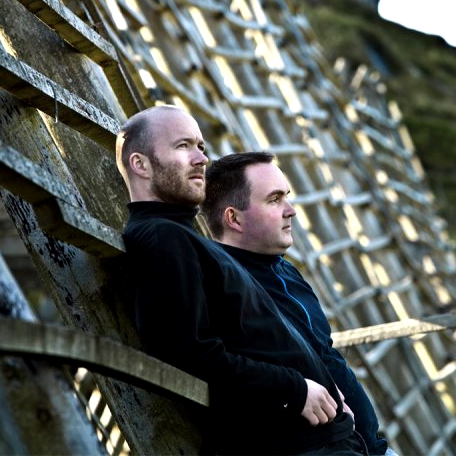 Third Pjusk album came out on Glacial Movements. And it's a killer. Interview with the duo about creating music, influences, past, future. And even more.
Third Pjusk album came out on Glacial Movements. And it's a killer. Interview with the duo about creating music, influences, past, future. And even more.
Pjusk first appeared on the American cult-label 12k, and with their debut album Sart they instantly became one of the finest pioneers of icy ambient music. This time none other than Alessandro Tedeschi, head of the excellent Glacial Movements approached the duo, and finally, Tele is out. And, as I said: it's a killer.
Not only keeps it the cold atmosphere and high-tech sounding of tiny little details, but it also moves toward previously unexperienced brightness. This combination of the sometimes severe Pjusk sound and the airy and uplifting textures and melodies culminates in the revelation that Tele might be the best Pjusk album so far. I chatted with Jostein Dahl Gjelsvik, here it goes.
Ha jobban fekszik a magyar, olvasd magyarul!Your first two gems came out at Taylor Deupree's 12k label, but your icy approach to ambient seems to fit perfectly for the Glacial Movements discography, too. Did you know the label previously? How did you and Alessandro get in touch?
Alessandro sent us an email where he presented his label concept and we immediately recognised the compatibility between Pjusk and Glacial Movements. Sval was already out and the thought of doing some sort of follow-up album was interesting.
More and more artists decide to release music individually, with no help of a label. How do you see the advantages of belonging to a record company?
The big advantage is joining a tribe or community of followers. This is especially the case for 12k. When a label is well known and respected, a lot of people will automatically check out your material solely based on the reputation of the label. Another important advantage is the role of the curator. We need someone outside our own process to challenge us and to evaluate our material in a neutral light. This kind of feedback is really valuable.
We - or more likely you - are experiencing a hard time of music industry, both the labels and artists. Aggravation of the consequences of piracy sounds frightening and exaggerating to many. It might be an inconvenient question, but I think the artists' point of view may be the most important today and will be in the future. So what do you think about it?
Not an easy question to answer. We are not professional musicians and are not making a living creating music. This way, piracy won’t harm us personally, but it is no denying that it creates problems for those who do choose to base their lives on being musicians or running a label. I think it is important to communicate awareness of how music is made and create an intrinsic respect for the art and the artists.
How do you work together? Do you, for example, start creating separately, or you just "jamming" around to tickle each others fancy?
Not much jamming, I am afraid. We usually start a track on our own and then present the result for each other and take it from there. This has to do with the way we work as well. I tend to be more into the arrangement and structuring of the track and Rune is more focused on experimenting and creating abstract sound layers. This is a rewarding combination of skill sets - as we don’t overlap too much.
Do you often use field recordings in your music?
Yes, we use various types of recordings in our music. Field recordings can contribute a lot to the overall feel of the track.
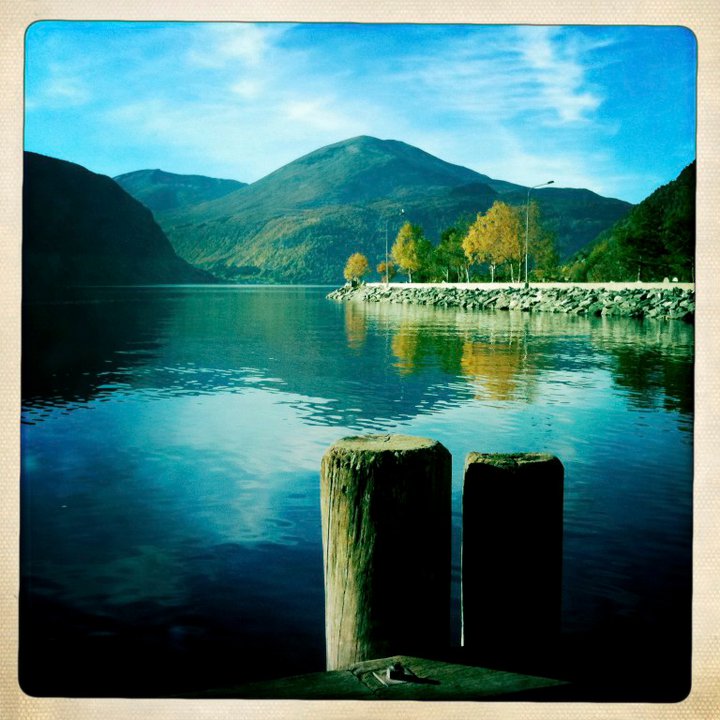 Ólafur Arnalds told in an interview that supposing the Scandinavian music to be influenced by the mysterious ambiance of nordic nature is a big cliché. But I've heard your music and creating process is highly determined by the location of your isolated studio in Valldal, right? Could you, for example, imagine to work in city environment?
Ólafur Arnalds told in an interview that supposing the Scandinavian music to be influenced by the mysterious ambiance of nordic nature is a big cliché. But I've heard your music and creating process is highly determined by the location of your isolated studio in Valldal, right? Could you, for example, imagine to work in city environment?
Yes, I am sure that would work out fine. But one of the main reasons for going to Valldal, is simply being able to focus over a longer period of time. We usually don’t stay there for more than 2-3 days the most and by the end of that period, we are quite drained. Being creative is all about self-discipline and dedication. It is about being focused and having a schedule for the studio sessions. That’s how I feel, anyway. You have to be stubborn and set yourself in motion and inspiration will guide you along the way.
Scandinavian ambient music definitely has a place in my heart. So I wonder who your favorites from your fellow artists are, or who influence you the most?
Biosphere has been the biggest influence since we started back in the old days, but nowadays we listen to a lot of different artists. I am not sure if we should mention anyone in particular, I think definitely Biosphere has made an impact on us. OK then. At the moment I am enjoying the works of James Murray who recently released his album "Floods" on his own label. Richard Chartier is also quite popular.
Jostein, what's up with Circular? The last album, Substans, came out at Ultimae and turned out to be quite popular. What's next?
Circular is still breathing, but we are just through a very rewarding process with Ultimae where we decided to move a lot of our material into a new project called Hydrofon. Our material was leaving the ambient genre (to some sort of cross-genre territory) and we had to find a solution in order to keep focus on what we wanted to achieve musically. We are happy Ultimae helped us understand this somewhat frustrating conflict and took part in solving it. Our producer, Frode Langhelle, joined Hydrofon as well and we have already one release scheduled for 2012 and probably more on the way. Website will be up soon with more information.
And what are your future plans for Pjusk?
We are already working on our next release on 12k. Hopefully we have something ready for 2013.
Are you looking forward to live performances? You ought to know that you're more than welcome in Hungary! :)
Live performances are great fun. Please invite us! We would like to see more of the world!
Taste the new album with this video track, and order it directly from Glacial Movements!

